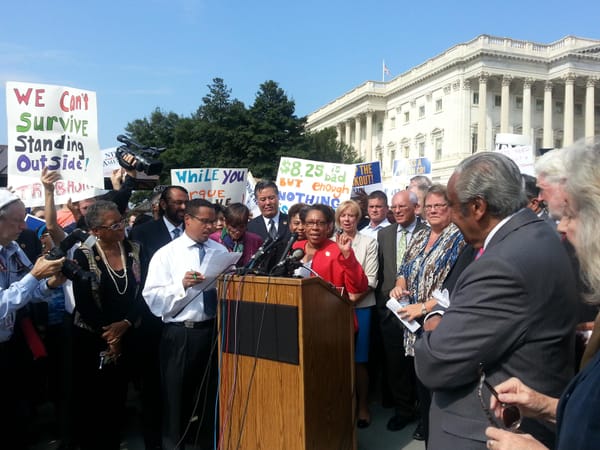Conflating Drugs to Terrorism is Manifest Illiberal Paternalism
There are so many things wrong with the president unilaterally ordering the obliteration of small boats in international waters that it's difficult to know where to start. The executive grabbing even more power over life and death? The absolute disregard for the citizens of other countries and diplomatic implications there? The erasure of any difference between military and police functions? But one is perhaps deeper than that: the conflation of terrorists, who violently harm other people, and drug dealers, who may well do harm but do so in meeting the demands of their customers, entirely denies agency to the people it claims to protect.
Drone strikes are of course nothing new - these weapons have been active for decades and in the news since the beginning of the Global War on Terror. And for nearly as long, the danger of creeping executive power with their use has been recognized. But they at least had a potential role to play - the idea strike organizations that existed to attack civilians and which could not effectively countered by other means with equally small collateral damage. Thus, the thinking went, a few targeted strikes were in fact self-defense, even it if it self-defense of a pre-emptive - and thus more problematic - nature. There are potential objection to be made about the validity of this line of reasoning, but at least following the logic of warfare and rules of engagement it had some reason to it. However, the expansion of this tactic into what has traditionally been seen as a law enforcement role has created a situation of even greater potential danger, particularly the way in which the president and others in the administration have been willing to blur the line between acts of war and fundamentally non-violent crimes.

The language used to justify these attacks, like in the tweet above, goes beyond the rather absurd insistence on the existence of 'narco-terrorists'. Admittedly, narcotic traffickers have committed terroristic crimes, particularly in Mexico. But the claim is not made the Venezuelan or Colombia cartels are invading America to shoot or bomb Americas - even an administration with a particularly lurid imagination can't quite make that narrative stick. Instead, the argument is made that the boat was coming to 'poison' Americans.
Poison, used as a weapon of homicide, is of course a violent act. But that's of course not what drug traffickers do, generally speaking (although individuals who adulterate drugs in the United States may be reasonably accused of poisoning their customers sometimes). Assuming the administration is telling the truth (rarely a good idea), these boats are bringing to the United States a product which Americans are going to ingest willingly, generally with a reasonable understanding of what it is. The most expansive definitions of 'liberty' would preclude anything resembling the drug war on precisely these grounds. This can be argued to follow naturally from Cesare Beccaria's Enlightenment essay On Crimes and Punishments:
"Every act of authority of one man over another, for which there is not an absolute necessity, is tyrannical. It is upon this, then, that the sovereign’s right to punish crimes is founded; that is, upon the necessity of defending the public liberty, intrusted to his care, from the usurpation of individuals; and punishments are just in proportion as the liberty, preserved by the sovereign, is sacred and valuable"
This sentiment can easily justify laws against violent and arguably property crime - a murderer or robber is guilty of diminishing the liberty of their victims (and indeed, by the fear they create, arguably the public as a whole). It is much harder to argue that drug trafficking interferes with the liberty of drug buyers, and arguably it is drug interdiction that in fact is the greater threat to liberty.
It can of course be argued that these drug traffickers, even if they are not poisoning Americans through deceit or compulsion, are nonetheless causing real harm, especially to individuals unable to resist due to addiction. Even the liberal theorist LT Hobhouse accepts this proposition, writing about alcohol that
"It may be added that, in the case of the drunkard—and I think the argument applies to all cases where overwhelming impulse is apt to master the will—it is a still more obvious and elementary duty to remove the sources of temptation, and to treat as anti-social in the highest degree every attempt to make profit out of human weakness, misery, and wrong-doing."
This has certainly been the philosophy adopted by most liberals in the 20th and 21st centuries, and the reasons why are quite apparent: the social costs of substance abuse are visible and have substantial spillover effects. Moreover, the apparent success of the welfare state as an institution in mitigating human suffering seems to suggest that the more paternal social liberalism of Hobhouse may be a necessary adaptation of liberal philosophy for the present day.
However, even if we accept that stopping the flow of drugs into the country is an appropriate use of government power, it does not follow that it is an appropriate use of military force. Drone strikes against actual terrorists abroad are arguably justified by the near impossibility of apprehending them. This is of course also part of the danger - the ability to strike enemies around the world without 'boots on the ground' tempts presidents to overuse these weapons. However, a boat at sea is not at all a comparable situation. As the rescue of two survivors of one of these strikes indicates, there is actually nothing preventing the US from interdicting suspected smuggler - and doing so could potentially allow for investigations and proper prosecutions of drug trafficking organizations.
The purpose of instead blowing these vessels out of the water seems instead to be intimidation - a way to implement the 'powerful death penalty' that Trump promised awaited drug dealers when he was campaigning. And in this particular instance, the goal seems quite explicitly to blur the lines between law enforcement and military action. But to return to Beccaria, this is precisely the disadvantage of capital punishment generally:
"The punishment of death is pernicious to society, from the example of barbarity it affords. If the passions, or necessity of war, have taught men to shed the blood of their fellow creatures, the laws which are intended to moderate the ferocity of mankind, should not increase it by examples of barbarity"
Beccaria warns about the tendency of capital punishment to work against what he sees as the moderating the effects of the law, by introducing more bloodshed rather than working to lessen it. This seems all the more true in this situation, where in fact it's quite plausible that the purpose of the airstrikes is to escalate the legal treatment of drugs to the level of a war, in order to justify a greater level of barbarity. To the extent that the administration succeeds in doing so, it opens the possibility of all manner of lethal actions against 'criminals', including citizens of whatever country - including this one. In that eventuality, the advanced technology of drone strikes could give this or future administrations tools capable of inflicting unprecedented levels violence against accused domestic enemies.



